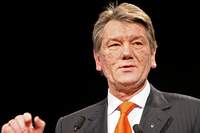Ukraine stands on the brink of war as thousands of military men enter Kiev
Ukrainian President Viktor Yushchenko sent several thousands of military men to the Ukrainian capital Saturday to demonstrate his strict control over security forces amid the political dispute with the nation's prime minister that raised fears of violence after months of political struggle.

Tensions between Yushchenko and Prime Minister Viktor Yanukovych - longtime foes - have been building since the president ordered parliament to be disbanded in April and called new elections. Yushchenko's move this week to fire the nation's chief prosecutor and take control of Interior Ministry troops escalated the standoff.
The ministry's 32,000 troops answer to the interior minister, a Yanukovych loyalist, but Ivan Plyushch, the head of the national security council, said the President had ordered to send the troops into Kiev.
"Moving the interior troops into the city is necessary to guarantee a calm life for the city, to prevent provocations," Plyushch was quoted as saying on the presidential Web site.
The statement did not specify how many troops have been sent, but Deputy Interior Minister Mikhail Korniyenko said 2,050 were moving toward the capital.
There was no word yet of the troops actually arriving in the capital, and news reports said some of the units were being stopped on their way to the capital by police. The reports could not be immediately confirmed.
Yanukovych and Yushchenko, along with other top political leaders, held another round of talks Saturday on defusing the crisis. Earlier meetings ended without visible progress.
Several hundred flag-waving supporters of both leaders held competing rallies in front of the presidential office, where Yushchenko and Yanukovych were meeting. A thin line of police separated the two camps of protesters to maintain order.
Yushchenko dissolved parliament on April 2, saying Yanukovych and his majority coalition were trying to usurp presidential power. But Yanukovych's supporters in parliament have defied the order, calling it unconstitutional, leading to weeks of debate and competing demonstrations between backers of the president and those of the premier.
Both Yushchenko and Yanukovych since have agreed to respect the Constitutional Court's decision on the dissolution order. But the court has been deliberating on the matter for weeks, and the hearings were complicated by Yushchenko's orders to fire several of its judges, including the chief judge.
Then, on Thursday, Yushchenko fired longtime foe Prosecutor General Svyatoslav Piskun - a Yanukovych ally - saying Piskun could not serve as the country's chief prosecutor while acting as a member of parliament.
Security officers were sent to oust Piskun, but riot police loyal to Yanukovych immediately moved to protect him, standing guard outside his office.
Piskun appealed to a Kiev district court and late Friday said the court ruled to reinstate him. The ruling could not be immediately confirmed and a Yushchenko aide said Saturday that Piskun was lying.
Tensions further escalated when Yushchenko claimed command of Interior Ministry troops - an order rejected by the ministry headed by Vasyl Tsushko, a Yanukovych loyalist.
Parties loyal to the two feuding leaders warned Saturday of possible violence.
Yanukovych's allies called for calm and restraint, but warned they would not back down in the dispute.
Tsushko promised not to use force, but his deputy, Korniyenko, said the ministry would fend off any possible attempts to take it by force. "Let them try, we have what we need to respond," Korniyenko said.
Piskun lamented that "cannon fodder was being sent to Kiev," adding that he would not hesitate to fire officials who violate the law.
"As long as I'm prosecutor general in this country, there will be no scenario involving force," he told reporters. "If there is a need to arrest interior troops chiefs, I will arrest them."
Analysts said Yushchenko's move to send troops to Kiev was an attempt to exert pressure on Yanukovych and prompt him to agree on an early date for the new parliamentary elections, rather than a sign he was preparing for a violent confrontation.
"I think these maneuvers with security forces are meant to give the president a chance to maneuver at talks," said Vadim Karasyov, head of the Kiev-based Institute on Global Strategies.
Ukraine has suffered chronic political turmoil since pro-Western Yushchenko came to office in 2005 after the Orange Revolution protests that broke out after Russian-leaning Yanukovych was counted as winner of a fraud-plagued presidential ballot. The Supreme Court annulled that vote and Yushchenko won a rerun.
But Yushchenko's goal of instituting political and economic reforms in the ex-Soviet nation have run aground over factional fighting among his supporters. In last year's parliamentary elections, Yanukovych's party won the largest share of seats, apparently benefiting from wide voter dissatisfaction with the country's stalled reforms and internecine political sparring.
Yushchenko repeatedly has declared his aim of bringing Ukraine closer to the West, including eventual membership in NATO and the European Union. The political turmoil has hampered those aims and fed criticism of him for actions that are either ineffectual or unilateral.
Subscribe to Pravda.Ru Telegram channel, Facebook, RSS!


